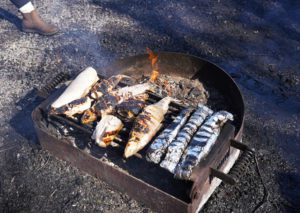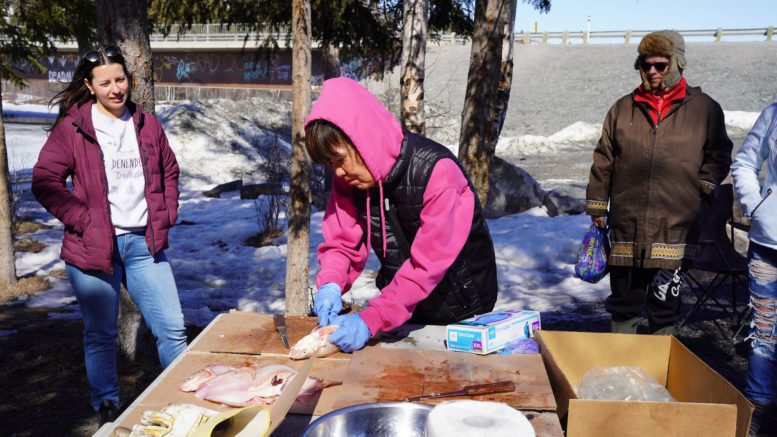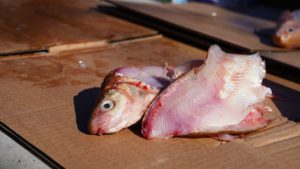Growing up in Churchill, Manitoba, Brenda O’Connor remembers times when fish was served for every meal.
That’s all we ever ate all summer long was fish for breakfast, lunch and dinner,” she said. “Never got sick of it then and still not sick of it.”

Brenda O’Connor prepares a fish for the campfire. (Ian Down/CKLB photo)
O’Connor got to show off her fish-dressing skills during a trapping workshop organized by the Department of Environment and Climate Change (ECC) and the Yellowknife Women’s Society (YWS) this week.
The program has been offered to inmates at the North Slave Correctional Complex for about a year now. The department also offers courses to more experienced trappers in every region of the territory. Now, workshops are being offered to women living at the YWS’s Spruce Bough centre.

Fish and baby potatoes on the campfire. (Ian Down/CKLB photo)
About a dozen participants from Spruce Bough took the trip to Yellowknife River for the workshop, which was all about preparing freshly-caught fish. They took turns gutting and preparing the fish, some filleting it, others preparing it their own way according to how they learned it growing up.
The fish was cooked over a campfire and served alongside roasted baby potatoes and coleslaw.
“This is very much an outreach program to encourage people to think about the trapper lifestyle and how that works and how that will work for them,” said Vincent Casey, an education and outreach coordinator with the Department of ECC.
He said the “pie in the sky” dream would be to one day have a trap line. For now, he said organizers are taking it slow and deliberate, learning from each expansion of the program.
O’Connor said she hopes the program will one day be offered to children in schools. “We’ve lost a lot of ways, our traditional ways,” she said. “And this just reminded me of who could learn from this.”
Casey says it’s too early in the program to say what positive impacts it will have. But Jayson Quesada, the general manager of the permanent housing program for the YWS, said he already sees the program working its magic.
“You see them, you see their smiling face, they’re more relaxed,” he said.
Quesada said the program is especially important given that the vast majority of Spruce Bough residents are Indigenous.
The program will continue to run at Spruce Bough every two to three weeks year-round, “because trapping isn’t just, say, ‘Go out in the woods, get a couple of animals, skin them, bring them the thing, and I’m done,'” says Casey. “It’s very much the idea that this is a year-round activity for people.”










